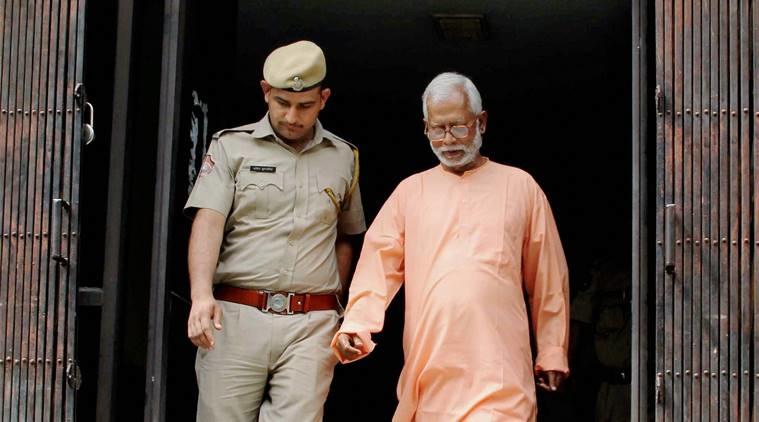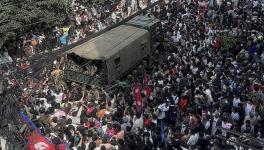Mecca Masjid Blast Case: Glaring Loopholes Emerge in the CBI Investigation

Image Courtesy: The Indian Express
After the acquittal of Swami Aseemanand and other accused in the Mecca Masjid Blast Case, serious questions over the investigation have started popping up. The Central Bureau of Investigation (CBI), the agency which investigated the matter till April 2011, failed to produce basic evidence to prove the culpability of Aseemanand and other Rashtriya Swayamsevak Sangh activists in the matter. A thorough observation of the Judgement delivered by NIA court shows that CBI, in its investigation, did not follow the standard procedures to collect evidence.
An Indian Express report stated that the CBI failed to prove that Aseemanand and Shaik Abdul Kaleem were in the same jail and same time. Aseemanand had allegedly confessed to Shaik Abdul Kaleem that he was one of the conspirators in Mecca Masjid Blast Case. Similarly, it failed to prove the date on which Aseemanand expressed his desire to confess before a district magistrate.
National Investigation Agency (NIA) judge K Ravinder Reddy, in his judgement on April 16, observed that it failed to prove that RSS activist Devender Gupta was a communal person who was involved in the blasts. It must be noted that Gupta has already been convicted in Ajmer Sharif Blasts case. The CBI also did not validate the call data records even though the investigating officer didn't examine the service providers.
Glaring loopholes
The 121-page judgement highlights several glaring loopholes in the investigation conducted by CBI before it was taken over by NIA in April 2011. The judge noted that the prosecution failed to explain why it got the confession of Aseemanand in front of a magistrate in Tis Hazari Court in Delhi when it could have been easily recorded in Hyderabad. “There is no explanation as to why the IO was in a hurry in moving an application before the CMM at New Delhi with a request to record the confessional statement of Accused number 6. He had ample opportunity to come down to Hyderabad and after the expiry of police custody of A6 he would have moved an application before the jurisdictional court with a request to record the confessional statement,” stated the judgement.
The CBI charge-sheet had cited the confession of Aseemanand before the magistrate and Kaleem as the main evidence against him. CBI stated the Aseemanand met Kaleem in Chanchalguda Prison in Hyderabad and chose to confess after he came to know that Kaleem was earlier arrested on the suspicion for involvement in Mecca Masjid Blast case.
The case was hit further when the judicial officer in his testimony said that Aseemanand was sent to police custody after his confession in Delhi. “A6 was not provided legal aid by CMM at New Delhi though he was provided with legal aid during the first spell of police custody. The testimony of the judicial officer itself proves that on December 18, A6 was in police custody. Thus, this court holds that the confessional statement of A6 is hit by Section 26 of the Indian Evidence Act. This court holds that the confessional statement of A6 was not a voluntary one…” read the judgement.
The investigation officer, SP Rajah Balaji, did not collect the details from Chanchalguda prison that Aseemanand and other lodged at the same dates. “Except the oral testimony, there is no other record to show that they were in jail when A6 (Aseemanand) was kept in that jail. The IO did not examine the then SP of Chanchalguda jail and record his statement showing that they were in jail during the period when A6 was in that jail. He could have collected the said material or recorded the statement of the jail SP but he did not do so,” stated the Judgement.
The judgement also highlighted that the investigation officer gave contradictory statements about the date on which Aseemanand expressed his desire for confession. His testimony stated that Aseemanand expressed his desire on December 16 whereas his cross-examination in the court revealed Aseemanand asked time for confession on December 10.
Unholy trio of Devender Gupta, Rajeshwar Rai and Aseemanand
The CBI could not prove the culpability of RSS Vibhag Pracharak Devender Gupta, who is accused of providing logistics in Ajmer Sharif and ha been convicted for life imprisonment, in the matter. The court observed that the CBI depended heavily on the oral evidence and failed to prove that he gave hate speeches in Jamtara in Jharkhand.
Another question that looms large is senior RSS functionary Rajeshwar Rai's statement that the module led by Aseemanand was conducting blasts at various Muslim shrines and religious places. Even, NIA and the CBI made him a witness in the matter.
Rai and Aseemanand have worked together in reconversion of tribals into Hindu religion. Rai also visited the Shabari Kumbh in Gujarat where Aseemanand and his associates decided to resurrect the organisation Abhinav Bharat to launch attacks against Muslims after attacks on Hindu temples. It is the Abhinav Bharat which later conducted blasts at Mecca Masjid and other religious sites.
Get the latest reports & analysis with people's perspective on Protests, movements & deep analytical videos, discussions of the current affairs in your Telegram app. Subscribe to NewsClick's Telegram channel & get Real-Time updates on stories, as they get published on our website.























